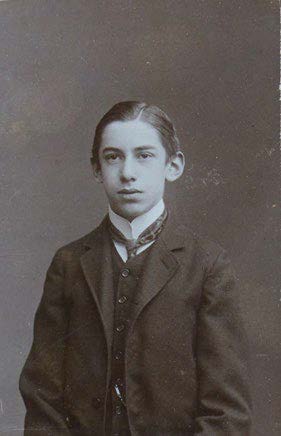Hans Majut
Hans Majut as a young man, date unknown. On the back of the photo is a handwritten note by Hans' brother Rudolf: “Picture of my brother Hans Majut: Dr. med. dent. Died by his own hand, driven to death by circumstances.” (Original in German)
© Hans Majut Literary Papers, MS 201/Photos and pictures/Box 2, University of Leicester Archives and Special Collections.
Since 2024, two books from Hans Majut's library have been returned.
Hans Majut was born in Vienna on December 30, 1892, as the son of Wilhelm and Anna Majut. The family belonged to the Jewish religious community. In 1897, Hans, his older brother Rudolf (1887-1981) and his parents moved first to Poland and then to Germany. The family settled in Berlin. His brother Rudolf was apparently the only member of the family to convert to Protestant Christianity in 1914. Little is known about the time during and after the end of the First World War. In a short story written by Hans Majut in 1933 entitled Die Flucht (The Escape), he gave a brief insight into his thoughts and related experiences during the First World War: “Like most of the lives of our time, the Great War also left a mark on mine”. Majut worked as a dentist, but was also a talented writer. The extent of his works has not been researched. It can be assumed that he regularly published short stories, including the aforementioned title from 1933 and the 1928 work The Prodigal Son. The Rudolf Majut Collection, which is held at the University of Leicester at the request of the donor, contains 123 poems by Hans Majut.
When the National Socialists came to power, a period of expulsion and persecution also began for the Majut family. Both parents had already died. With the Law for the Restoration of the Professional Civil Service of April 7, 1933, the brothers Hans and Rudolf lost their professional state positions due to their Jewish origins. Rudolf Majut, who had worked as a student councilor and later as a teacher, was given his position back for a short time as he had served in the First World War. In 1935, he was expelled from the Reichsschrifttumskammer (RSK) and from then on was no longer allowed to publish. Hans Majut saw no way out for himself and committed suicide on August 16, 1937. His last known address was Witzlebenstraße 17 in Berlin, where he had lived since 1935. Hans Majut was single and had no children. Tragically, he had written a short story entitled The Suicide almost 20 years earlier. In the same year, 1937, Rudolf Majut dedicated the volume of poetry Der Werdekreis to his deceased brother.
At the time of Hans' suicide, Rudolf was in Basel, where he was studying Protestant theology after he was no longer allowed to teach in Nazi Germany. During this time, Rudolf was already dating Käthe Genetet (1905-2005), a German math teacher. She followed Rudolf to Switzerland. In order to work as a teacher in Nazi Germany, it was necessary to be a party member. She refused to do so, ostensibly because she loved Rudolf Majut.
With the support of the Bishop of Chichester, Dr. George Bell, the couple reached England in May 1939. Rudolf and Käthe married on June 7, 1939. After a short period of internment in Hutyon, Rudolf worked as a pastor in the internment camp on the Isle of Man. In 1941, the couple were able to move to Leicester, where they lived until their deaths.Rudolf initially worked as a German teacher and then moved to Vaughan College, then to Loughborough College and finally to the University of Leicester. The couple were granted British citizenship in 1947.
There were no children from the marriage. Research also revealed that neither Hans nor Rudolf Majut had any heirs. Rudolf Majut handed over parts of his written estate, which included numerous works by Hans Majut, to the University of Leicester in 1970. His wish was that the books “should not be included in the German Studies Department of the University Library, but should be kept separately and in a room of their own as the basic collection of a German studies department such as the ‘Institute of Germanic Studies’ at the University of London or the Taylor Institution in Oxford”. Rudolf Majut also stipulated that the books were only intended for students.He wanted them to be kept in a locked room that was to be made “homely” for researchers.The letter concludes with the words: “I have made this decision out of gratitude for the honor bestowed upon me by the University”. This honor was apparently his honorary professorship, which was awarded to him after his retirement in 1970.
The books identified in the Central and Regional Library were donated to the University of Leicester. There, the book was added to the Rudolf Majut Collection, where parts of Hans Majut's surviving estate are already held. The books are now part of the Rudolf Majut Collection. In consultation with colleagues at the University of Leicester's Special Collections, the books will be added to the protected collection on the basis of their provenance. We would like to thank Eleanor Bloomfield, Library Advisor, for her assistance with the restitution.
The fate of the previous owner and the way in which the books were acquired by the Berlin City Library does not allow for any other assessment than a Nazi-related seizure. It is possible that the previously identified books were in the possession of Rudolf and Käthe Majut until they fled and then had to be left behind, giving the National Socialists access to the objects
